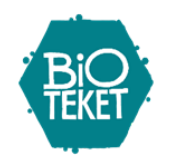
Bioteket is a volunteer- based green culture hub for sustainability, where science, culture, art and green activism flouris together. Established in 2016 , Bioteket is a secret treasure in Nørrebro, Copenhagen. It is made of upcycled and refurbished shipping containers on two levels:
A Workshop, laboratory, and growing space for mushrooms on the ground level, and a greenhouse that accommodates the growth of plants, fish, insects, social events, and sustainable ideas on the first floor. Furthermore, there are open gardens and community gardens connected to the space.
Quick facts
Founded 2016
Based in Copenhagen, Denmark
SDGs impacted by the companies’ activities: 11 , 12 , 13 , 15 and 17
How does the organisation address societal challenges in an innovative way?
The Home is a 251 hectares estate for change- makers to connect, learn and deepen their connection to nature, themselves and others. The estate can be used to work, for taking part in impact- related events, join retreats and organize own individual events. The place offers homegrown organic food, fresh water from the mountains, and rivers, silence, and a warm and comforting place to stay, including suites for some extra luxury members. There are also tents in the forest to be even closer to nature. The home facilitates inspiring people to meet each other, share knowledge, and visions and grow.
How does the organization address societal challenges in an innovative way?
The Project aims at tackling global issues by acting local. One aspect that they are working towards is the democratization of access to knowledge about nature and science, and how it relates to citizens’ lives. Thus, the project welcomes people of all ages and nationalities to join and co- create together, physically, and virtually.
Cross- communities collaborations are fostered and cherished. Furthermore, they aim to facilitate knowledge acquisition and transfer in a fun way. They offer the opportunity to learn about, play with, and subsidize experiments on sustainable urban living in all its forms.
What societal benefit does the organization create?
It gives people a space to develop and grow natural produce, work and think in sustainable and ecological ways than they previously would have done. It enables people to become more self- sufficient and contribute to a healthier and more sustainable local environment. Bioteket participates in events and develops workshops throughout the year on various topics that foster the ethos of sustainability, culture and inclusion. The skills below can offer people new pathways to business creation in sustainably produced food and drinks, it can also inspire people to bring sustainability training to their own workplace.

Bioteket activities are mainly focused on sustainability and green culture is fostered by citizens across the region. For example, on Saturdays, the volunteer- driven food-sharing CPH distributes free surplus fruits and vegetables from Bioteket. Permanently located in a rebuilt container, Bioteket serves as a design- and culture house, focusing on organic gardening projects and communities for both children and adults.
They, furthermore, run projects such as “ Taste the waste”, which was about enabling people to think about the food waste created every day. The event aimed to help families reimagine and understand food together in a community while having dinner.
The Sensory Garden was another initiative produced by Bioteket in collaboration with the IT University of Copenhagen. The goal was to make the space outside Bioteket more inviting while creating awareness about Bioteket among locals by enticing them to participate in a playful activity in green surroundings. The f inal design is a plant bed placed outside Bioteket with a screen hanging above it. The screen invites passers- by to interact with the plants by touching them. Touch is registered by the MPR121 capacitance sensor which activates sound and the screen to display information about Bioteket.